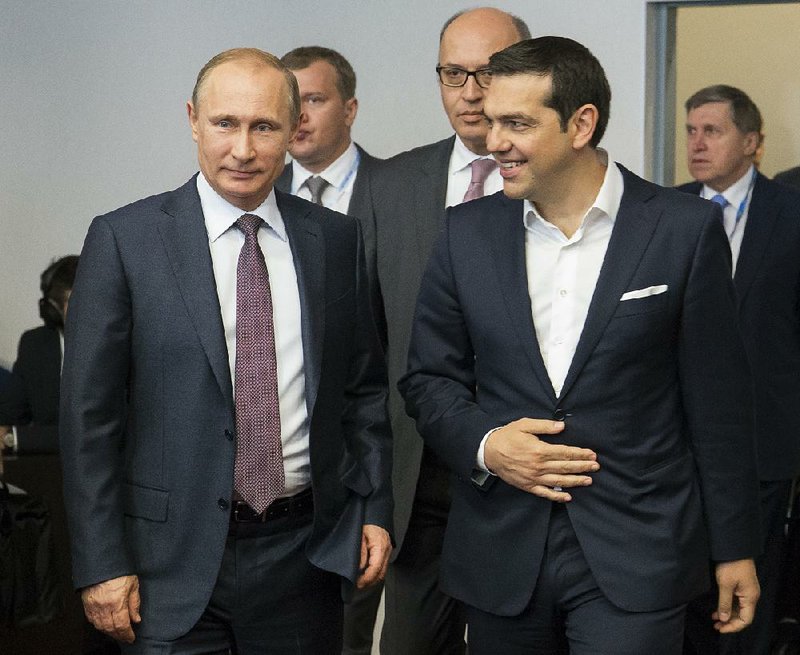ST. PETERSBURG, Russia -- Russia isn't seeking dominance or superpower status, but it wants its interests to be respected by the United States and its Western allies, President Vladimir Putin said Friday.
Speaking at the St. Petersburg International Economic Forum, Putin repeated a string of accusations against the U.S. But he also called for stronger international efforts to fight the Islamic State extremist group, stem the proliferation of weapons of mass destruction, combat epidemics and respond to other global challenges.
Putin insisted that Russia wants February's Ukraine peace agreement to succeed. He said fighting there will stop once Ukraine provides broader rights to its eastern rebel regions, gives amnesty to the rebels and calls local elections there.
Ukraine and the West have accused Russia of breaking the peace deal by supporting the rebels with troops and weapons. Moscow denies this.
Commenting on the accusations, Putin said the rebels are defending themselves against the Ukrainian military. He added that "once an attempt is made to solve the problem by political means, those weapons will be gone."
He reaffirmed his long-held claim that Russians and Ukrainians are one people who will have a common future despite the current crisis, while adding that Ukraine has the sovereign right to choose its own path.
European Union and U.S. sanctions over Ukraine have helped push Russia's economy into recession and cut investment and imports dramatically. Putin, however, argued Friday that the Russian economy is on the path to recovery and that the West hurt itself by imposing the sanctions.
Putin's speech on the economy decidedly lacked any engagement on his part or specific proposals to turn around the economy. A large number of Russian and foreign investors in the audience were reading news or emails on their smartphones as Putin delivered a speech in which he did not address the severe crisis that businesses in Russia are facing.
In contrast to the economy speech, Putin was much more animated while responding to questions about foreign policy.
His emphasis on foreign policy has reflected the way the Kremlin has been running Russia since the Ukrainian conflict began. Critics have blamed Putin for sacrificing the country's economic growth for geopolitical ends such as the 2014 annexation of Crimea.
David Iakobashvili, founder of Russia's once-largest beverage company and head of a Russia-U.S. business council, said businessmen have gotten used to the fact Putin seems to prioritize foreign-policy goals over domestic development.
"It's very clear today that geopolitics is more important from his point of view," he said. "But ... we shall adapt to whatever environment has been presented by the government and act accordingly."
Putin used the investment conference as yet another opportunity to blame the U.S. and the European Union for triggering the Ukrainian crisis by refusing to take into account what he described as Russia's legitimate interests.
"They have pushed us back to the line beyond which we can't retreat," he said. "Russia isn't seeking hegemony or some ephemeral superpower status."
But Putin still said Russia wants to cooperate with the West in tackling global threats and challenges -- including the Islamic State, calling the extremist group an "absolute evil" that requires stronger joint efforts to combat.
Putin also said Russia wants a deal ending the standoff over the Iranian nuclear program to be signed as planned before the end of June, but cautioned against putting "unfulfillable" demands upon Tehran.
And he also voiced readiness to encourage Syrian President Bashar Assad to discuss the peaceful transition of power. He explained Moscow's backing for the Syrian ruler was to prevent the victory of radical forces who would begin a reign of terror.
"We are ready to work with the president to ensure political transformation, so that all Syrians have access to instruments of power," he said.
A Section on 06/20/2015
